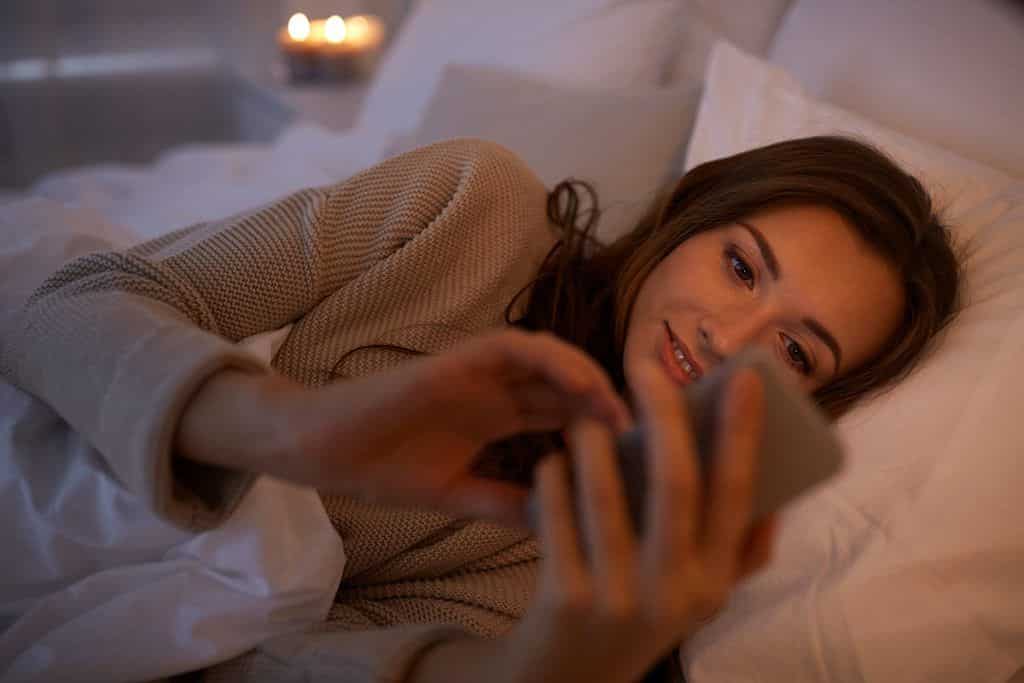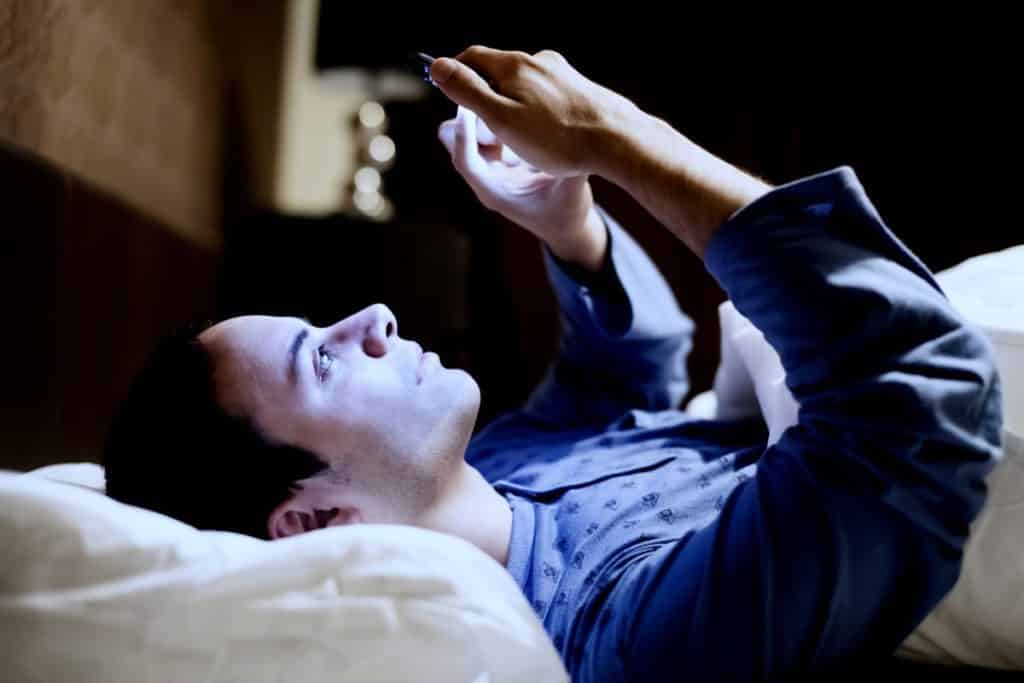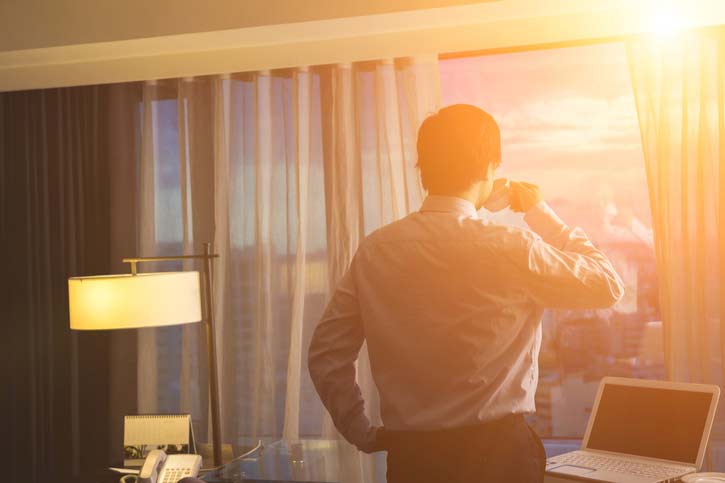You’ve likely heard that blue light from electronics can affect your sleep patterns and make you feel tired in the morning. But what exactly is blue light, and how does it stop you from sleeping? We’ve broken it all down for you! Read on to learn what blue light is, how it affects your brain, and what devices emit it.
What Is Blue Light?
Light is emitted in waves of different lengths that create different colors we can see. Blue light is created by the blue wavelength on this light spectrum. The blue wavelength is short and has a high frequency.
What Devices Emit Blue Light?
Electronic devices like televisions, smartphones, e-readers, and computer screens emit blue light. LED and fluorescent lights also give off some blue light. If you want to cut down your blue light exposure, consider blue light blocking glasses or a blue light filter app. You can also use your device’s “night shift” option. These glasses and apps block blue light and filter in more orange and yellow light. You can also cut down on screen time and use artificial light sources that illuminate your house in warmer tones.

Effects of Blue Light
According Melissa Barnett, principal optometrist at UC Davis Eye Center, blue light can boost brain activity and help you stay awake. This makes it great for concentrating at work. But getting too much blue light can disrupt your sleep cycle by decreasing melatonin levels. It might also strain your eyes. So it is important to limit your blue light exposure, especially before bed.
What Does Blue Light Do to Your Brain?
Blue light, like all colors of light, prompts certain brain activity. Blue light can make you feel more alert, help your memory, and put you in a better mood. It might even improve your reaction time! But we naturally get blue light from the sun, so getting a lot of blue light exposure from electronics can negatively impact your sleep quality. Blue light (and other bright light) tells your brain not to release melatonin, throwing your circadian clock out of whack and preventing healthy sleep. It’s part of the reason why binge-watching TV is hurting your sleep. If you can’t stop scrolling on your phone before bed, put your devices in night mode to cut out some of the disruptive blue light.
Is Blue Light Bad for Your Eyes?
Researchers are still studying how blue light affects our eyes. But most, including Dr. Barnett, agree that overexposure to blue light can contribute to age-related macular degeneration, cataracts, and eye cancer. Children are more likely to develop eye problems from blue light because their growing eyes absorb more light. Blue light might also cause eye strain, especially if you spend all day looking at a computer. If your eyes feel tired or dry after work, consider investing in amber tinted glasses to reduce the amount of blue light you absorb during the workday.

How Does Blue Light Affect Sleep?
Blue light can prevent you from getting good sleep because it tells your brain not to secrete melatonin, which is what causes sleepiness. When melatonin secretion is disrupted, it can negatively affect your circadian rhythm and lead to sleep disorders and next-morning tiredness. Want to get better sleep? Check out or deep dive into how light affects sleep and read our guide to circadian rhythm to become an expert on your sleep cycle.
Blue Light vs UV Light
UV, or ultraviolet light, is on the purple end of the light spectrum. Unlike UV light, blue light is on the visible light spectrum. According to eyecare company Hoya, this means it penetrates deeper into our eyes and may cause more eye strain than UV light. UV light is invisible but may cause skin cancer and aging. UV light is a big reason why we wear sunscreen!
Blue Light vs Sunlight
Blue light is found within sunlight! In fact, about 25% of sunlight is made of blue light. The sun is our main source of blue light, and according to a study for the National Library of Medicine the blue light from the sun is what can help us stave off gloomy moods and seasonal depression. But sunlight also includes many other wavelengths on the visible light spectrum, combining to become the white light we associate with daylight.

Blue Light vs Red Light
Red light is made of longer waves than blue light and has a different effect on our brains. In fact, it’s almost the total opposite! Per one study for the Journal of Athletic Training, red light can stimulate the production of melatonin, which might help you fall asleep. Red light therapy is used to treat aging and scarring. Red Light Therapy might also prevent declining eyesight.
How Long Before Bed Should I Avoid Blue Light?
Avoiding your laptop and cell phone for two to three hours before bed can help prevent sleep problems caused by blue light. This will allow your brain time to produce melatonin and make you feel sleepy, which can make it a lot easier to drift off to sleep. If you like to watch TV before bed, try popping on a pair of blue light glasses or setting your computer to night mode before firing up Netflix.
FAQs
Is blue light bad for sleep?
Yes, blue light from electronic devices can make it hard to fall asleep at night. Blue light tells your brain it is time to be awake and alert.
Can blue light cause insomnia?
Blue light can make it hard to fall asleep. Avoiding blue light may help your insomnia, but it won’t cause insomnia on its own. Insomnia is a sleep disorder that can be caused by a variety of issues. Check out our What Is Insomnia? guide to learn more.
Can blue light cause headaches or migraines?
Yes, blue light might cause a headache or migraine, especially if one of your triggers is bright light. Using blue light-blocking glasses or a blue light filter on your devices might help. Read our How to Sleep with a Migraine article for tips on managing a nighttime migraine.
Does blue light keep you awake?
Yes, blue light stops melatonin production in the brain, which keeps you up at night. Avoid using electronics before bed to prevent blue light from impacting your sleep schedule.
Do blue light glasses help you sleep?
Yes, using blue light glasses for at least two hours before bed can help you sleep. The glasses will block out blue light that tells your brain to stay awake, allowing it to make plenty of melatonin and help you fall asleep.

